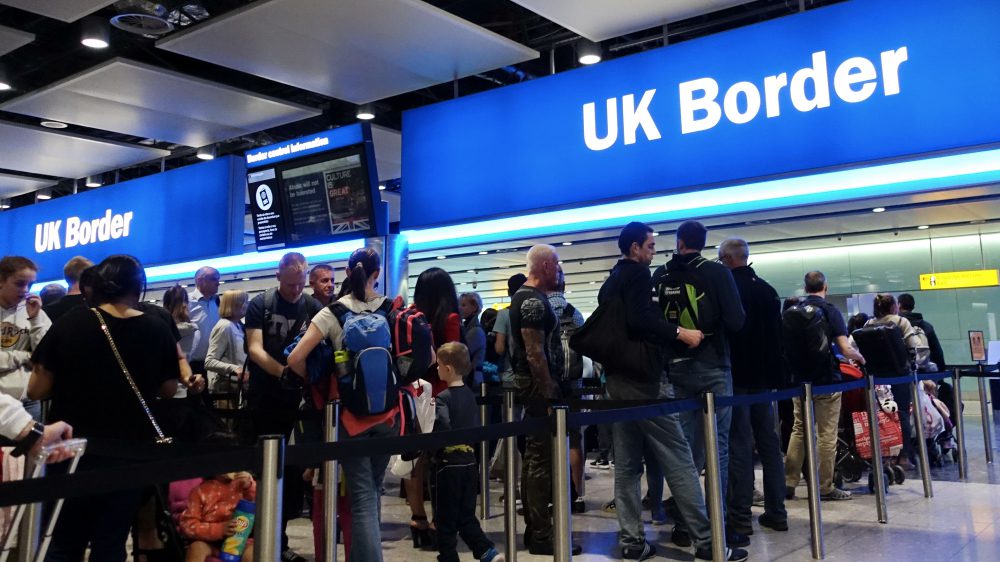
A rift has emerged within the new Conservative government over how best to approach the issue of immigration. According to the Times, Prime Minister Liz Truss is eager to relax controls at the border as part of an effort to plug up shortages in the labour market, court international talent, and boost the economic growth on which her deficit-financed tax cuts depend.
Pre-existing immigration caps and official targets were ditched when Boris Johnson was in Downing Street. The consensus in the Tory Party held that the mere event of Brexit had, as polls suggested, assuaged public concern over the eyewatering levels of net migration into Britain since 1997. Now that citizens no longer regarded it as a central issue, it would be counterproductive and inflexible to keep any caps or targets in place. The pre-2016 anxiety over immigration, went the conventional wisdom, was rooted in a perception of a loss of control, not fear over high numbers themselves. Truss is basically gambling that this truly reflects public opinion and, therefore, that she will not be punished in 2024 for staking her promise of economic recovery, at least partly, upon increased levels of imported migrant labour.
Johnson had governed in much the same way, just less explicitly. Only last month, it was reported that immigration had reached a new high under Johnson’s watch, with over one million UK visas issued to foreign nationals over the last year. This was in addition to the considerable surge in illegal migrants crossing the English Channel, which has more than doubled to around 24,000 per year. The persistence of such problems, complained the Tory government’s right-wing critics, showcased a lack of seriousness on the part of ministers to follow through on their 2019 manifesto pledge to crack down on migration, be it legal and illegal. Sir John Hayes, a former minister in the British Home Office, issued the following statement at the time:
We promised at the last election to take back control of our borders. That includes dealing with illegal migration which is a festering sore that never seems to heal but also stemming the tide of legal migrants entering the country.
Truss seems happy to keep disappointing the same people on the right flank of her party. However, it is also likely that Truss’s ultra-liberal approach to immigration will tank her popularity with the many voters who, in the aftermath of the Brexit shock, had wanted a government willing to deemphasize the absolute value of GDP if it meant a stronger, more socially cohesive nation.
The new prime minister is turning out to be just another one of those Conservatives, very typical of the modern age, for whom money is more important than national loyalty or the common good. Loosening immigration rules, she calculates, is just an inevitable economic imperative. Sebastian Milbank, online editor of The Critic, took to Twitter to denounce this neo-liberal mentality in the most withering terms:
Labour shortages are not just “bad” — they drive up wages and productivity, and force companies to invest in training and new technologies. Unless of course we kill the dynamism of our economy with the narcotic of unlimited foreign labour on demand https://t.co/LSapLqcYPS
— Sebastian Milbank 🥀🇬🇧🏴 (@JSMilbank) September 26, 2022
Alp Mehmet, chairman of Migration Watch UK, offered the following comment:
Recruiting the right high-skilled migrants into jobs where they are needed can of course be beneficial; so long as rigorous controls, such as reasonably high skill and salary controls (both of which were lowered post-Brexit) are applied. This is not what the government has in mind. Instead, over the next few years we are going to take in hundreds of thousands of middle and lower-skilled workers, mainly because this is the cheaper option.
Some cabinet ministers, including Home Secretary Suella Braverman and Secretary for Business Jacob Rees-Mogg, are said to have doubts about the policy. “Liz Truss,” added Mehmet, “needs to rethink these proposals if she is to stand any chance of re-election in 2024.”
In fairness, Truss has made a point of insisting that in her relentless drive to pursue high economic growth, she is prepared to make herself unpopular. No doubt opinion polls in the months ahead, particularly on the question of immigration, will test the strength of that commitment.
